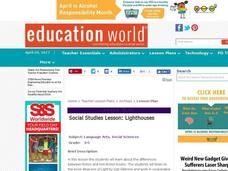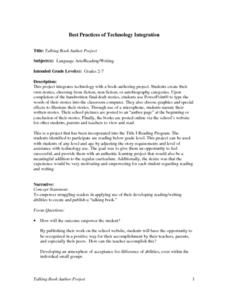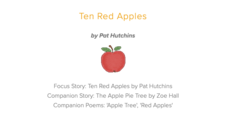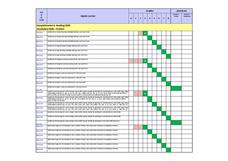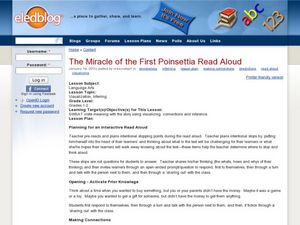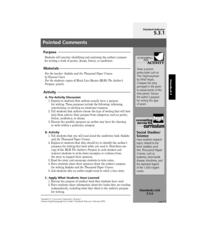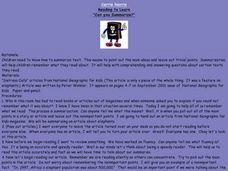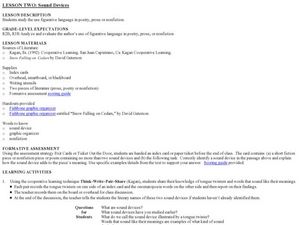Curated OER
Different Genres In Literature
Third graders view different genres of literature and identify which genre is being presented to them. In this genres lesson plan, 3rd graders choose from fiction, non fiction, and a poem.
Curated OER
Understanding Core Values Using the Frayer Model
Young scholars complete the Frayer Model. In this literature instructional activity, students review the concept of theme in literature. Young scholars identify major themes in books they've read. Students learn the attributes of the...
Curated OER
"Lighthouses"
Students listen to the book "Beacons of Light" by Gail Gibbons and identify the different characteristics and facts concerning lighthouses and their history. They examine the differences between fiction and non-fiction books and engage...
Curated OER
Talking Book Author Project
Students explore fiction, non-fiction, and autobiographies. They create their own stories using one of the categories. Students create a PowerPoint presentation to tell their story.
Curated OER
Short and Sweet
Students explore how to summarize a text while reading. They discuss what it means to summarize. Students read a non-fiction text and practice summarizing the pages they read. They highlight the main ideas and important details within...
Curated OER
Ten Red Apples; The Five Senses
A clever lesson designed around an apple awaits your learners. Descriptive words are used to explain what they believe is inside a bag while using their five senses. Students read the story The Apple Pie Tree and are introduced to the...
Curated OER
Just the Facts, Ma'am
Students use tables of content, chapter titles, and key words as a strategy for organizing non-fiction information. They write a paragraph with a partner using information from a graphic organizer.
New York State Education Department
TASC Transition Curriculum: Workshop 5
Are video games sports? Pupils investigate this question as well as various nonfiction selections to learn more about claims and the support that defines them. All of the selections mimic the rigor on state tests and encourage close...
Consortium for Ocean Science Exploration and Engagement (COSEE)
Understanding the Food Web
Building on prior knowledge of the pervious lesson plan in the series, pupils explain the previous lesson plan to each other. Then they write a simple guide for a young child to read on the same topic.
Curated OER
Summarizing Key Information
Students summarize information. In this language arts lesson, students summarize information from a fictional text. Students read a folktale and summarize the story.
Curated OER
The Miracle of the First Poinsettia
Connecting to literature and learning how to infer are two great reading strategies everyone needs to know. Here, the class will read along with the story The Miracle of the First Poinsettia, review folktales as a genre, and make...
Curated OER
Reading a Newspaper
Students define the terms associated with parts of a newspaper. They identify various sections of a newspaper and the type of articles found in each and provide the responses to who? what? when? where? and why? contained in a ...
Curated OER
Analyzing Textbook Formats
Students explore the characteristics of a non-fiction text. For this comprehension lesson, students are led on a guided tour of each text and identify the features of a non-fiction text. Students continue to practice locating features...
Curated OER
Go For The Gold!
Third graders read fiction and nonfiction works for comprehension. Using the internet, 3rd graders participate in a WebQuest. They compare and contrast the Olympics in ancient Greece to the modern day Olympics. Afterwards, students...
Curated OER
Immigration to the United States
Middle schoolers discover the implications of immigration. For this immigration lesson, students read fiction based on immigration experiences as well as non-fiction on the topic. Middle schoolers write and share book reviews of the...
Curated OER
Pointed Comments
Fifth graders analyze pieces of writing to identify the author's purpose of writing. In this writing lesson plan, 5th graders consider a variety of pieces of writing such as, poetry, drama, fiction, and non-fiction. Each student...
Curated OER
How-To Books
Students apply their knowledge and create a how-to book of their own. In this early childhood language arts worksheet, students learn about non-fiction books and write their own procedural non-fiction booklets.
Curated OER
Introduction to Immigration
Students read and discuss selected library resources (both fiction and non-fiction) about children and immigration. They discuss some of the historical trends that have occurred in patterns of immigration to America.
Curated OER
Who, What, When, Where And Why is He There?
Students examine the process of asking the 5 W questions in order to increase their reading comprehension while reading non-fiction passages. They review silent reading techniques before listening to a teacher read aloud, and discussing...
Curated OER
Evaluate Problem-Solving in the Context of Culture and Time-frame
Students examine literary elements in non-fiction literature. In this problem solving lesson, students read Rosa Parks, My Story and Beyond the Limits. Students make oral presentations based on the causes and effects, conflicts, and...
Curated OER
The Bear Facts About Summarization
Students practice summarizing techniques in this lesson. They listen as the teacher reads from a non-fiction article, and the class creates a story map to highlight the most important facts from the article. They use the map to write a...
Curated OER
Can you Summarize?
Students write summaries of non-fiction articles in this instructional activity. They read the article silently and then pick out the main points. Students list the main events as a whole class activity, and then they individually...
Curated OER
Parts of a Book
Second graders learn to identify the parts of a book. For this book parts lesson, 2nd graders learn the names of book parts by participating in a teacher led lesson in which they look at transparencies. They complete a worksheet in which...
Curated OER
Sound Devices
Learners examine the impact of sound devices in poetry, prose, and non-fiction. In this figurative language lesson, students read instructor-selected literature and identify uses of alliteration, repetition, consonance, rhythm, rhyme,...
Other popular searches
- Non Fiction Reading Passages
- Reading Non Fiction
- Reading Non Fiction
- Active Reading Non Fiction
- Shared Reading Non Fiction
- Reading Non Fiction Text
- Non Fiction Reading Pre Test
- Non Fiction Reading Skills
- Non Fiction Reading Journal
- Non Fiction Reading Logs
- Lesson Non Fiction Reading
- Non Fiction Reading Lessons


